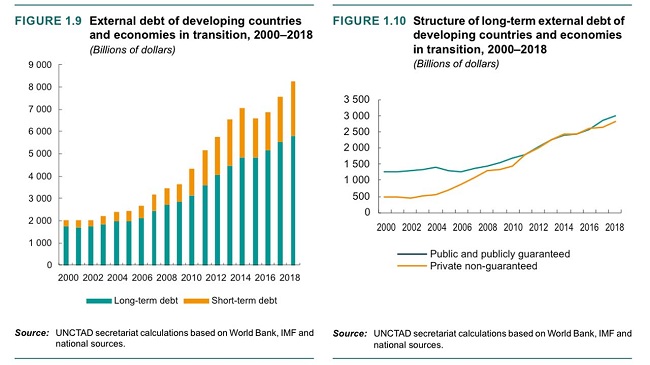Invest Wisely, There Maybe A Global Recession Next Year UNCTAD Warns
The world economy is heading into troubled waters, with recession in 2020 now a clear and present danger, according to United Nations Conference on Trade and Development (UNCTAD’s) Trade and Development Report 2019 released yesterday.
According to UNCTAD, warning lights are flashing around trade tensions, currency movements, corporate debt, a no-deal Brexit and inverted yield curves but there is little sign that policymakers are prepared for the storm ahead.
The report calls for a focus on boosting jobs, wages and public investment to replace policymakers’ obsession with stock prices, quarterly earnings and investor confidence.
The slowdown in growth in all the major developed economies, including the US, confirms that relying on easy monetary policy and asset price rises to stimulate demand produces, at best, ephemeral growth, while tax cuts for corporations and wealthy individuals fail to trigger productive investment.
Trade growth is set to slow sharply this year following weakening global demand, compounded by the unilateral tariff actions of the United States administration; trade growth dropped to 2.8% last year and is likely to be closer to 2% this year.
Among the developing economies, Nigeria’s economy grew year-on-year in the second quarter of 2019 by 1.94%, riding on the back of stable oil prices to push the half-year (H1) growth to 2.02%, Nigeria’s Bureau of Statistics said earlier in the month.
However, when compared to 2.10% recorded in the first quarter of 2019, the Q2 real growth rate indicates a decline of 0.16% point.
The decline in Q2 may be due to the dip in crude oil production. Production slowed to 1.98 million per day as against 1.99 million recorded in the preceding quarter.
The oil sector grew by 5.15% while the non-oil saw a 1.64% increase during the quarter.
The bigger concern, according to the UNCTAD report, is that 10 years on from the crisis, the global economy remains excessively financialized and fragile.
“Talk of currency manipulation is exaggerated but if history is any guide, the underlying threat portends serious trouble for the monetary system; while, efforts to stymie technological progress in the South by revising trade rules could have a chilling effect on international cooperation.
“Despite their weak record since the crisis, unconventional monetary measures — negative interest rates and quantitative easing — along with further rounds of trade liberalization, remain the go-to policies for addressing weakness in the global economy”, the report showed.
UNCTAD is calling for a fundamental rethink of “business as usual”.
The report argues for a Global Green New Deal, supported by a new approach to international monetary arrangements aimed at promoting productive trade and reining in predatory finance. This approach would boost public investment with an eye to averting an environmental breakdown and promote wage-led growth in place of finance-led growth.
While economic worries are mounting in the advanced world, the growth deceleration is likely to be more painful in many developing regions, notably Southern Africa, Latin America, South and West Asia.
Even before the rising trade tension, growth rates were slipping in parts of the developing world as a result of falling capital inflows — following announcements of monetary tightening by leading central banks — which have in some cases already turned negative, compounded by falling commodities prices.
According to Richard Kozul-Wright, director of UNCTAD’s Division of globalization and development strategy, “talk of convergence between North and South amongst international investors has been exaggerated; for many developing countries, per capita income divergence is the new normal”
These weaknesses are emerging in the context of a significant build-up of debt across the developing world, much of it short term and denominated in foreign currencies, with the biggest increases in the private sector.




